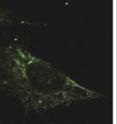With HMGB1's help, cells dine in
Like some people, cells eat when they are under pressure—but they consume parts of themselves. A multi-function protein helps control this form of cannibalism, according to a study in the September 6 issue of the Journal of Cell Biology (www.jcb.org). Cells often respond to hunger or stress by digesting some of their contents. The process, known as autophagy, helps free nutrients and clean up cytoplasmic trash such as worn-out organelles and misshapen proteins. A team led by researchers at the University of Pittsburgh Cancer Institute discovered a link between this form of cellular recycling and the protein HMGB1. The team showed HMGB1 to be a critical pro-autophagic protein that enhances cell survival and limits programmed cell death.
The findings suggests that blocking HMGB1 could benefit cancer patients, since tumor cells often rev up autophagy to withstand chemotherapy, immunotherapy, and radiation treatment.
Source: Rockefeller University Press
Other sources
- Cells can eat parts of themselves, with help from one proteinfrom Science DailyTue, 7 Sep 2010, 3:14:11 UTC
- With HMGB1′s help, cells dine infrom Science BlogMon, 6 Sep 2010, 17:14:17 UTC
- With HMGB1′s help, cells dine infrom Science BlogMon, 6 Sep 2010, 17:14:15 UTC
- With HMGB1's help, cells dine infrom PhysorgMon, 6 Sep 2010, 16:35:13 UTC
